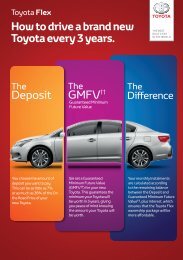Toyota Environmental Sustainablity Report
Toyota Environmental Sustainablity Report
Toyota Environmental Sustainablity Report
You also want an ePaper? Increase the reach of your titles
YUMPU automatically turns print PDFs into web optimized ePapers that Google loves.
Engaging with Employees<br />
Takashi Karasawa<br />
Vice-President Human Resources<br />
& Business Services<br />
Stable Employment<br />
We have made every effort to maintain stable employment<br />
for our permanent employees. The step-by-step approach<br />
that we introduced in FY08 to minimise the impact of<br />
required cost reductions continued in FY10, in addition to<br />
some of the structural changes, such as limited recruitment<br />
and minimising overtime:<br />
We continued a limited ratio of “work-sharing” in <strong>Toyota</strong><br />
Motor Manufacturing Turkey (TMMT), where labour cost was<br />
reduced with a commensurate reduction in working time<br />
In <strong>Toyota</strong> Motor Manufacturing UK (TMUK), we needed to align<br />
our production capacity to demand, and therefore stopped<br />
one production line. To adjust the headcount, TMUK initiated<br />
its second voluntary separation scheme, where approximately<br />
850 members chose to leave. This necessitated a massive<br />
multi-skill training initiative to allow every team member who<br />
opted to stay to gain the skills to work on the operational line<br />
In <strong>Toyota</strong> Motor Europe a voluntary resignation programme<br />
was also introduced and approximately 200 members opted<br />
to fi nd external opportunities.<br />
To a limited extent, some of our NMSCs also optimised their<br />
organisations, while ensuring thorough communication with<br />
their members.<br />
Employee Communication<br />
In all the European countries in which we operate, we adhere<br />
to European and national legislation. In line with this, employee<br />
representation bodies are in place to inform and communicate<br />
within the framework of social dialogue based on mutual trust,<br />
Despite the fact that we are in our third year of<br />
this crisis, we take pride in the fact that we have<br />
made every effort to maintain our ideology and<br />
values on how we treat our employees. While<br />
we were again forced to reduce some of our<br />
headcount, we continued to work hard to try and<br />
achieve this through voluntary means, supported<br />
by effective communication.<br />
respect and responsibilities. Regular information sharing and<br />
required consultations with European and national bodies<br />
contributed to maintaining the relationship and ensured<br />
understanding by employee representatives on the business<br />
situation and company’s position.<br />
In line with the agreement with our European Works Council,<br />
which is called the <strong>Toyota</strong> European Forum (TEF), additional<br />
meetings were convened to discuss the various business<br />
issues in our European operations.<br />
Under the continuing severe business and economic<br />
conditions, it was critical to communicate with all our<br />
employees in an open and timely manner. On several<br />
occasions face-to-face meetings were organised between<br />
the company management and employees to explain critical<br />
business issues and company decisions. Pan-European<br />
employee briefi ngs were held throughout the year to ensure<br />
consistent and thorough communication with all European<br />
employees.<br />
Employee Motivation Survey<br />
Takashi Karasawa<br />
One of the ways we monitor and measure employee<br />
engagement is through our employee motivation survey. The<br />
survey is conducted every two years and includes all our<br />
European affi liates. While NMSC employee engagement was<br />
relatively high and in line with high performing benchmarks,<br />
this was not achieved in the manufacturing plants and the<br />
head offi ce, where a dip was seen against the 2008 results.<br />
The results were communicated to employees and in line<br />
with local practice and requirements, working groups or<br />
management workshops were established to develop action<br />
plans to address the identifi ed issues. As a result of the<br />
motivation survey, numerous changes have been introduced<br />
in the areas of communication, training and HR systems.<br />
<strong>Toyota</strong> European Sustainability <strong>Report</strong> 2011 I Social Performance<br />
47

















